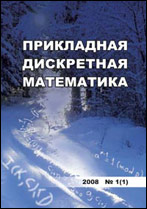|
This article is cited in 1 scientific paper (total in 1 paper)
Theoretical Backgrounds of Applied Discrete Mathematics
Superpositions of free Fox derivations
V. A. Roman'kovab
a Dostoevsky Omsk State University, Omsk, Russia
b Siberian Federal University, Krasnoyarsk, Russia
Abstract:
Fox derivations are an effective tool for studying free groups and their group rings. Let $F_r$ be a free group of finite rank $r$ with basis $\{f_1, \ldots, f_r\}.$ For every $i$, the partial Fox derivations $\partial /\partial f_i$ and $\partial /\partial f_i^{-1}$ are defined on the group ring $\mathbb{Z}[F_r]$. For $k\geq 2$, their superpositions $D_{f_i^{\epsilon}} = \partial /\partial f_i^{\epsilon_k} \circ \ldots \circ \partial /\partial f_i^{\epsilon_1}, \epsilon = (\epsilon_1, \ldots , \epsilon_k) \in \{\pm 1\}^k,$ are not Fox derivations. In this paper, we study the properties of superpositions $D_{f_i^{\epsilon}}$. It is shown that the restrictions of such superpositions to the commutant $F_r'$ are Fox derivations. As an application of the obtained results, it is established that for any rational subset $R$ of $F_r'$ and any $i$ there are parameters $k$ and $\epsilon$ such that $R$ is annihilated by $D_{f_i^{\epsilon}}$.
Keywords:
free group, group ring, Fox derivations, annihilators, rational subsets.
Citation:
V. A. Roman'kov, “Superpositions of free Fox derivations”, Prikl. Diskr. Mat., 2022, no. 56, 28–32
Linking options:
https://www.mathnet.ru/eng/pdm768 https://www.mathnet.ru/eng/pdm/y2022/i2/p28
|

| Statistics & downloads: |
| Abstract page: | 108 | | Full-text PDF : | 45 | | References: | 23 |
|




 Contact us:
Contact us: Terms of Use
Terms of Use
 Registration to the website
Registration to the website Logotypes
Logotypes








 Citation in format
Citation in format 
